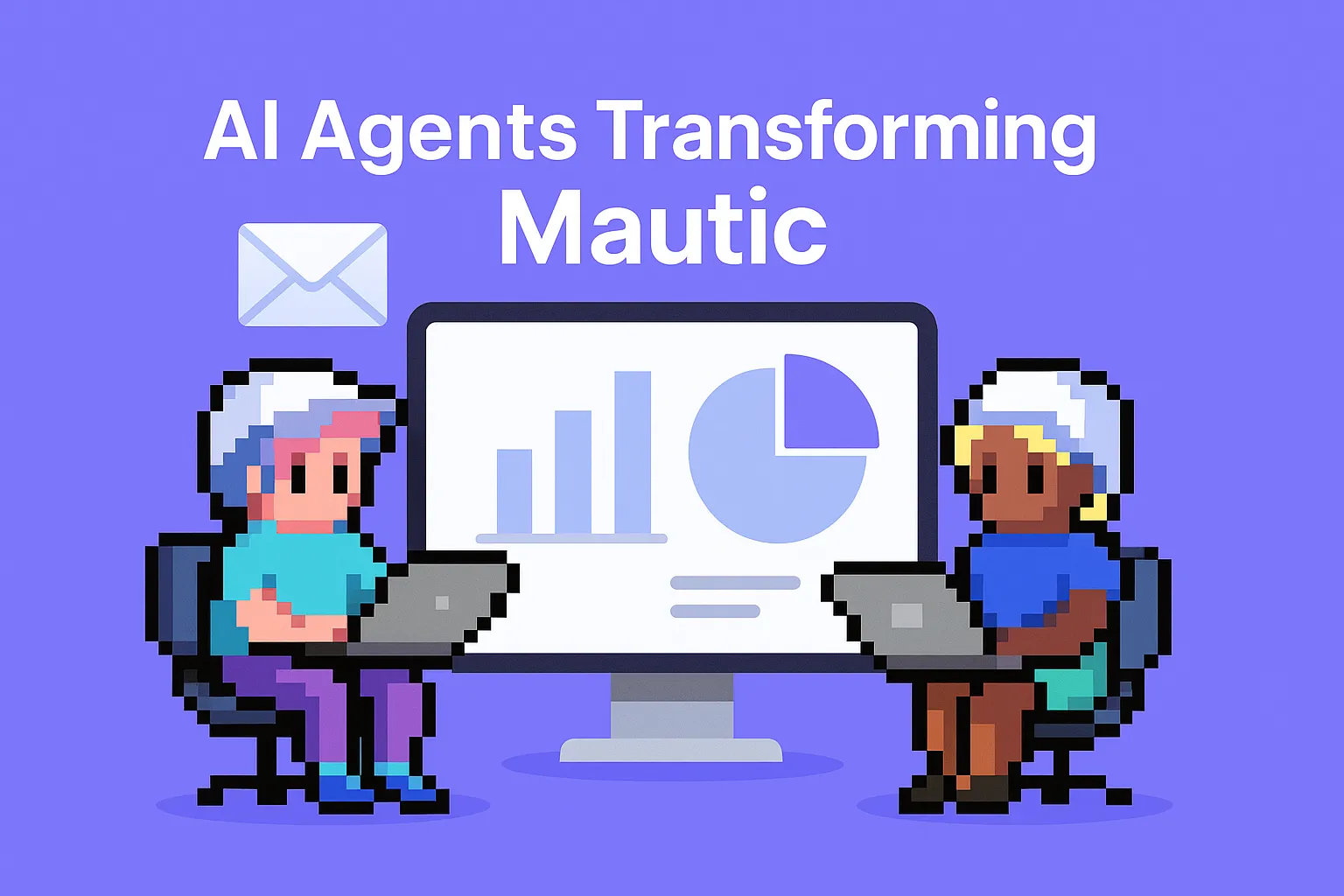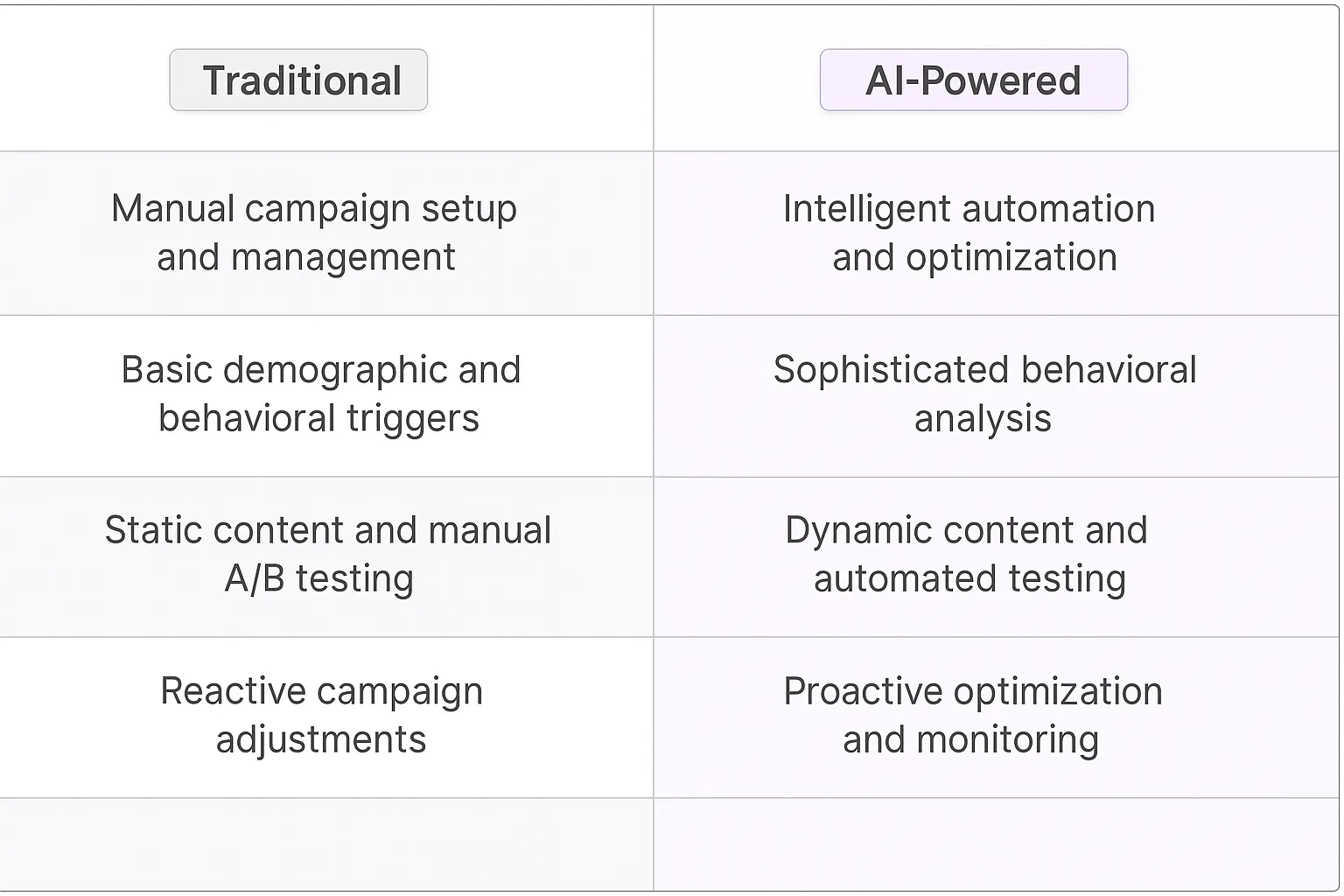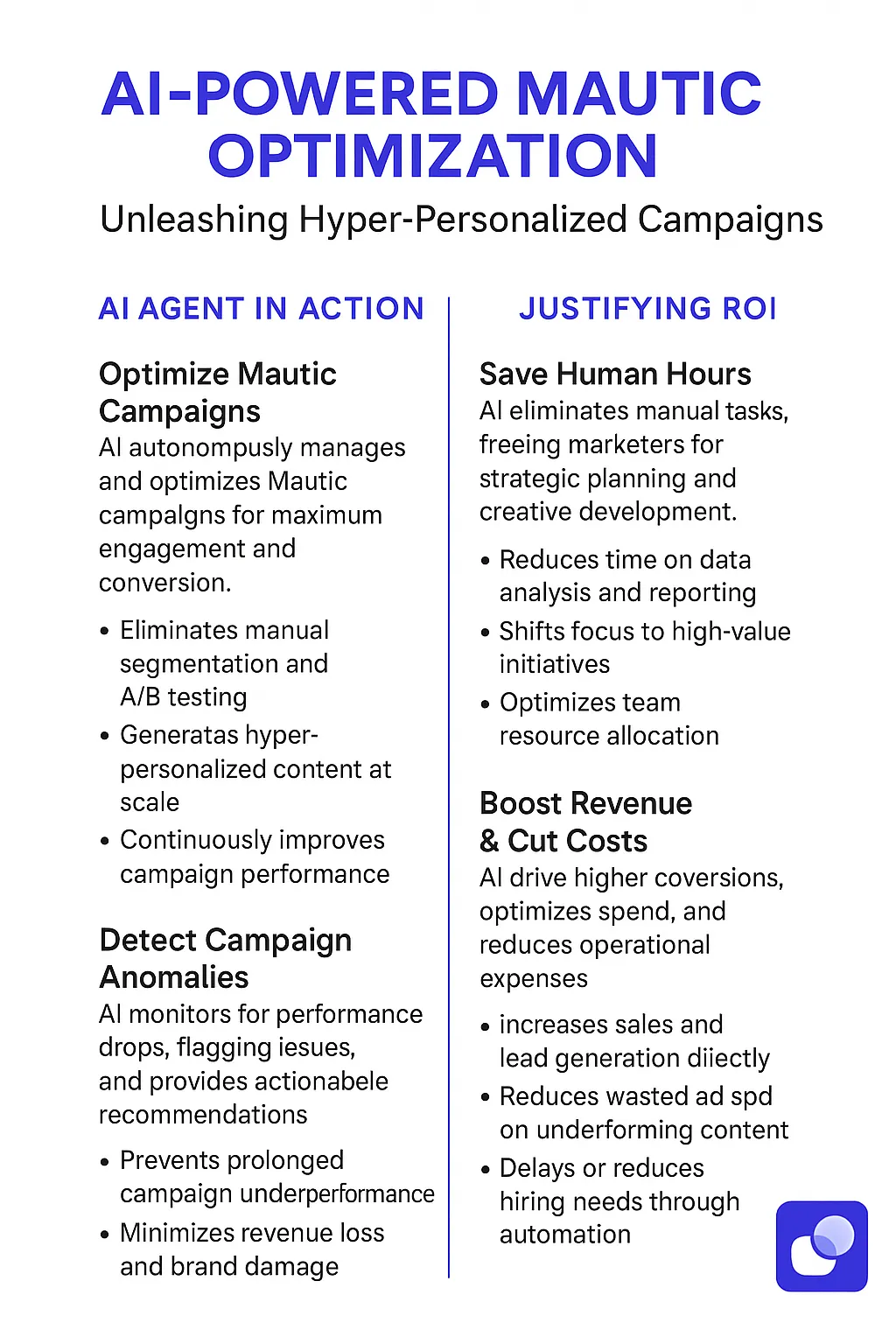Mautic
Understanding Mautic's Marketing Automation Platform
Mautic stands as the leading open-source marketing automation platform, designed to help organizations build sophisticated marketing campaigns and nurture customer relationships at scale. The platform combines robust contact management, multi-channel campaign orchestration, and detailed analytics in a flexible, customizable system. Unlike proprietary solutions, Mautic gives organizations complete control over their marketing data and processes.
Key Features of Mautic
- Advanced contact management and segmentation capabilities
- Multi-channel campaign orchestration
- Dynamic content personalization
- Lead scoring and qualification
- Detailed analytics and reporting
- API-first architecture for seamless integration
- Complete customization flexibility

Benefits of AI Agents for Mautic
What would have been used before AI Agents?
Marketing teams traditionally relied on manual processes to manage their Mautic campaigns. They spent countless hours writing email sequences, segmenting contacts, and analyzing campaign performance data. The process involved multiple team members coordinating through spreadsheets, maintaining documentation, and handling repetitive tasks that drained creative energy.
What are the benefits of AI Agents?
AI Agents transform Mautic marketing operations through intelligent automation and data-driven decision making. These digital teammates excel at pattern recognition across vast amounts of campaign data, enabling marketers to optimize their strategies with unprecedented precision.
The agents can automatically:
- Generate personalized email content based on subscriber behavior and preferences
- Segment contacts using sophisticated behavioral analysis
- Monitor campaign metrics in real-time and make data-driven adjustments
- Create A/B test variations to maximize conversion rates
- Identify trends and anomalies in campaign performance
The network effects are particularly powerful - as more marketers use AI Agents with Mautic, the underlying models become increasingly sophisticated at predicting what content and strategies will resonate with specific audience segments.
Beyond pure automation, these agents serve as growth accelerators by surfacing actionable insights that human marketers might miss. They can identify micro-segments ready for targeted campaigns and spot early indicators of campaign fatigue before engagement metrics decline.
The most significant benefit is the shift in how marketing teams operate. Rather than getting bogged down in tactical execution, teams can focus on high-level strategy and creative work that drives real business impact. The AI handles the heavy lifting of campaign management while marketers retain full control over brand voice and strategic direction.

Potential Use Cases of AI Agents with Mautic
Processes
Marketing automation through Mautic becomes significantly more powerful when paired with AI agents. These digital teammates can monitor campaign performance in real-time, adjusting email send times and content variations based on engagement patterns. They excel at segmenting contact lists with sophisticated behavioral analysis, creating dynamic segments that evolve as user interactions change.
The agents can orchestrate multi-channel campaigns by analyzing cross-channel performance data and automatically optimizing the timing and sequence of touchpoints. When integrated with Mautic's lead scoring system, AI agents can refine scoring models by identifying previously unknown engagement indicators that correlate with conversions.
Tasks
AI agents transform day-to-day Mautic operations through targeted automation of high-value tasks:
- Dynamic content generation for email campaigns, landing pages, and forms based on audience segment characteristics
- Predictive analytics to identify leads most likely to convert, enabling proactive engagement
- Automated A/B testing of campaign elements with intelligent optimization based on performance data
- Natural language processing of customer interactions to extract sentiment and intent signals
- Anomaly detection in campaign metrics to quickly identify issues or opportunities
- Automated report generation with insights highlighted and recommendations for optimization
The real power emerges when AI agents handle the complex coordination between these tasks - creating a self-optimizing marketing engine that continuously improves based on real performance data. This moves marketing teams from reactive to proactive campaign management, focusing human creativity where it matters most.
For growing companies, these AI capabilities effectively multiply the output of marketers without requiring additional headcount. The agents handle the data-heavy lifting while marketers focus on strategy and creative direction - leading to more sophisticated, personalized campaigns that drive measurable business results.

Industry Use Cases
AI agents integrated with Mautic transform how businesses approach marketing automation and customer engagement. Marketing teams across industries leverage these digital teammates to execute sophisticated campaigns while maintaining authentic connections with their audiences. The real power emerges when examining specific industry applications - from tech startups scaling their lead nurturing to enterprise organizations orchestrating complex multi-channel campaigns.
The intersection of AI and Mautic's marketing automation creates unique opportunities for different sectors to enhance their marketing operations. Rather than replacing human marketers, these AI capabilities augment their expertise by handling data analysis, content optimization, and campaign management tasks. This allows marketing professionals to focus on strategy and creative work that drives meaningful business outcomes.
Looking at real-world applications across various sectors reveals how AI agents adapt to distinct industry needs while working within Mautic's robust framework. Each use case demonstrates a blend of automation intelligence and industry-specific knowledge that delivers measurable impact.
Technology Industry: Scaling Developer Relations with Mautic AI
Developer relations teams at tech companies face a unique challenge - they need to engage and support thousands of developers while maintaining authentic, technically-relevant communications. A Mautic AI agent transforms this process by analyzing developer behavior patterns and crafting personalized engagement strategies.
The AI agent monitors developer interactions across documentation pages, GitHub repositories, and community forums. It identifies which developers are building what types of applications, their preferred programming languages, and common technical obstacles they encounter. This deep behavioral understanding enables highly targeted outreach.
When a developer struggles with API integration, the AI agent automatically triggers contextual help resources. It sends code samples, relevant documentation, and connection to developer advocates who have solved similar issues. The communication feels natural and helpful rather than promotional.
For developer marketing teams, the AI agent segments developers by technology stack and engagement level. Early-stage developers receive foundational resources while experienced builders get advanced use cases and architecture patterns. The AI continuously refines these segments based on how developers interact with the content.
The results speak for themselves - companies using Mautic AI for developer relations see 3-4x higher documentation engagement and 60% faster time-to-integration. The AI agent becomes an extension of the DevRel team, scaling their ability to support developers while maintaining the technical depth developers expect.
Most importantly, the AI agent preserves the developer-first mentality that's crucial for building trust. It focuses on solving technical problems and adding genuine value rather than pushing marketing messages. This authentic approach is why leading tech companies are adopting Mautic AI to grow their developer ecosystems.
E-commerce Industry: Mastering Customer Lifecycle Marketing with Mautic AI
Online retailers operate in a world of razor-thin margins where customer acquisition costs keep climbing. The most successful e-commerce brands are shifting focus from one-time transactions to building lasting customer relationships. Mautic AI agents make this transition possible by orchestrating sophisticated lifecycle marketing programs at scale.
The AI agent analyzes thousands of customer interaction points - from browse behavior and purchase history to support tickets and social engagement. It builds rich customer profiles that go beyond basic demographics to understand product preferences, price sensitivity, and buying triggers. This deep understanding enables truly personalized marketing.
When a high-value customer shows signs of churn risk, the AI agent activates targeted retention campaigns. It identifies the optimal mix of exclusive offers, early access to new products, and VIP perks based on that specific customer's motivations. The outreach feels personal and relevant rather than desperate.
For acquisition teams, the AI agent identifies patterns in successful customer journeys and replicates those experiences for new shoppers. First-time visitors see social proof and educational content while returning browsers get personalized product recommendations. The AI continuously optimizes these journeys based on conversion data.
E-commerce brands using Mautic AI see 40% higher customer lifetime value and 25% lower churn rates. The AI agent becomes an extension of the marketing team, enabling them to deliver Amazon-grade personalization without Amazon-sized budgets.
The system excels at identifying micro-segments and behavior patterns that humans might miss. A luxury fashion retailer discovered a highly profitable customer segment of working mothers who browsed late at night and responded well to SMS notifications about flash sales. These data-driven insights drive real business growth.
The future of e-commerce belongs to brands that master the art of relationship marketing at scale. Mautic AI makes that future accessible to online retailers of all sizes.
Considerations and Challenges
Implementing AI agents for Mautic requires careful planning and understanding of both technical and operational hurdles. Marketing teams need to evaluate their readiness across multiple dimensions before diving in.
Technical Challenges
Data quality stands as the primary technical barrier. Mautic's AI capabilities depend heavily on clean, structured contact data and engagement metrics. Organizations often struggle with fragmented data across multiple systems, inconsistent field mappings, and incomplete contact records.
API rate limits and infrastructure requirements also pose significant technical hurdles. AI agents need consistent access to Mautic's API endpoints while respecting usage limits. Teams must ensure their hosting environment can handle increased computational loads from AI processing without impacting core Mautic functions.
Operational Challenges
The learning curve for marketing teams represents a major operational challenge. Staff need training not just on the AI tools, but on data interpretation and decision-making based on AI outputs. This requires developing new workflows and establishing clear guidelines for when to rely on AI versus human judgment.
Integration with existing marketing processes demands careful orchestration. Teams must define handoff points between AI and human marketers, establish QA protocols for AI-generated content, and create fallback procedures for when AI systems encounter edge cases.
Governance Considerations
Privacy and compliance requirements add another layer of complexity. Marketing teams must ensure AI agents handle personal data in accordance with GDPR, CCPA, and other relevant regulations. This includes implementing proper data retention policies and maintaining transparency about AI usage in customer communications.
Setting realistic expectations among stakeholders proves crucial. While AI can significantly enhance Mautic operations, it won't solve every marketing challenge. Teams need clear metrics for measuring AI impact and regular assessment of whether the implementation aligns with business objectives.
The Future of AI-Powered Marketing Automation
The marriage of AI Agents and Mautic represents a significant leap forward in marketing automation capabilities. Organizations that successfully navigate the implementation challenges gain a powerful advantage - the ability to deliver personalized, data-driven marketing at scale while maintaining authentic customer engagement. As AI technology continues to evolve, the potential for innovation in marketing automation grows exponentially. Marketing teams that embrace these digital teammates today position themselves to lead in the next generation of customer engagement.













